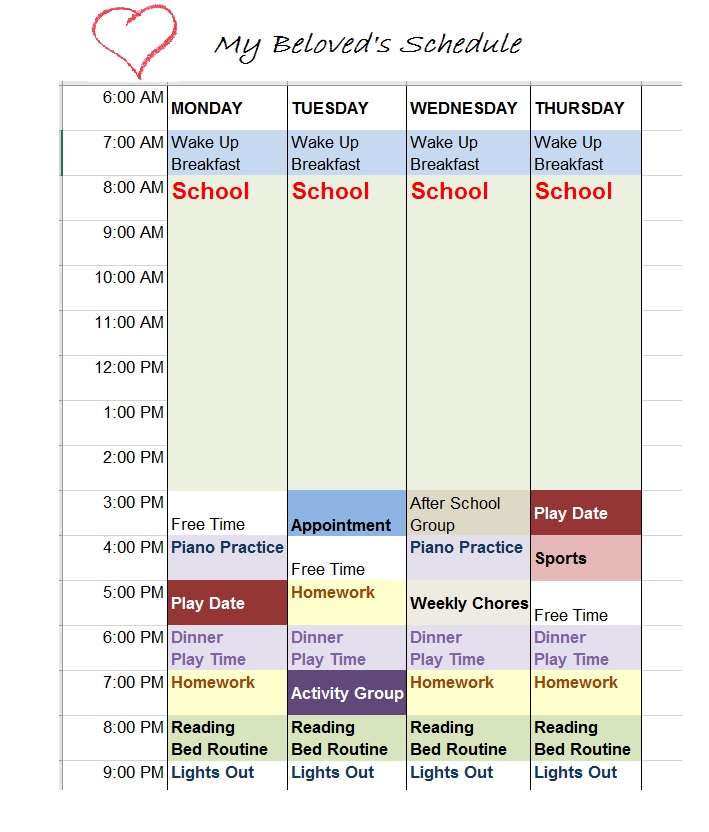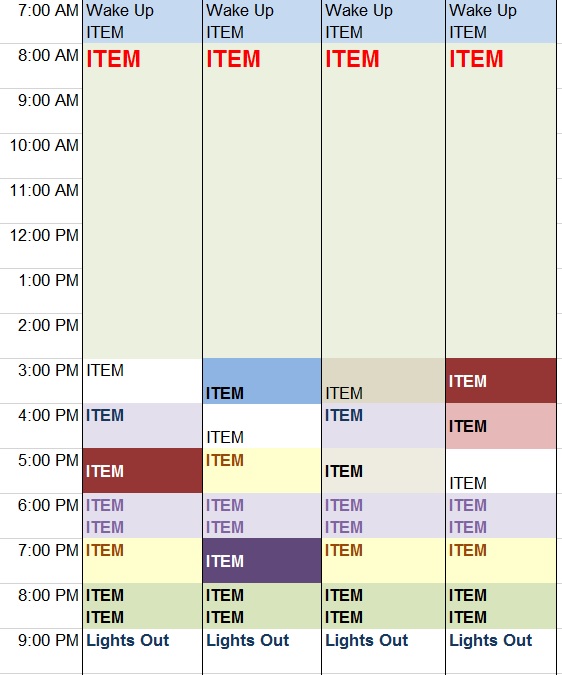Many children are missing out on the joys of childhood, because busy parents are imparting their own busyness onto them, filling their plates with hectic schedules that are beyond the child's ability to handle without undue stress.
A study published in the journal Frontiers in Psychology revealed that over scheduling children can harm their own development.
Let's consider the following typical regimen of a child:
- 32.5 hours a week in school
- 5 hours of home work time
- 5 hours of reading time
- 2 hours of practice sessions (piano, art, dancing, etc)
Plus add sports, clubs, weekly activities, church, pre-scheduled "play dates", and pre-scheduled anything and before you know it, your child is pushing 50 hour or more weeks, leaving them utterly exhausted.
One may not think that a play date is part of a work load, but if it is something on a schedule, then the assumption can be completely wrong. Activities that are pre-scheduled and begin at a certain time have bundled with them definite amounts of stress, as there is a constant push to be timely to the next item on the calendar, and the ability to simply unwind is not present.
It is hard to imagine that a large number of parents are inadvertently working their children into exhaustion and this can literally put adult levels of stress onto a child that surely doesn't need it.
A Child's Calendar.
Have a look at a typical schedule for a child, notice at all the easy and stress free items in it, there are play dates, free time and play time.

Now compare this schedule to that of an adult. Do not look at the activities, simply look at the number of time slots. Some may take look at the above schedule and at first glance, it may seem easy with so much play time and free time. But now let's have a look at the schedule without the activity names:

Suddenly the child's schedule quickly starts to look like that of a busy adult. Research shows that a full schedule for a child, even if it is full of "recreational items" can actually have the opposite effect of recreation and cause anxiety and stress. We adults are quite familiar with this strange paradox. Imagine you go on your next vacation, off to some place you have dreamed of going to. But as soon as you arrive, you fill your day with scheduled "fun items", one right after the other. And you repeat this the next day. It only takes a few days of this for you to start feeling exhausted and wanting to simply have "down time" without the noise and hassle of a schedule.
We are busy people, our lives are constantly on the go. Children learn incredibly deep from their parents, and one thing you can count on them learning is that they know you are active, busy, and full of task items. If your schedule becomes their schedule, it can impair their development.
Within the realm of competitiveness, of which we work and play in, it can appear that the best jobs, schools and opportunities go to the swiftest, brightest and most socially engaged. While in part true, if this mindset becomes a part of parents drive for their children, it can become dangerous.
In one part of the study, researchers looked at a set of parents who had a full week of scheduled activities for their young child. The child seemed to perform well and do well, however, once the parents removed their child from his extra-curricular activities, he was completely exhausted and worn down.
Children Cannot Cope Like You
Children can experience stress in profound ways, and sometimes its worse for them than it is for us adults because they lack the lifetime of coping skills we have developed. In fact, stress is probably pretty heavy on you as it is, even with your lifetime experience of coping with it. Imagine now, your level of stress on a child, minus your ability to cope.
Children perform poorly when exhausted. They score lower on tests, have lower self esteem, lower drive and lower performance. This is certainly a state you want to avoid.
Our children are not meant for stress, they are meant for development. Some stress is naturally part of life, but too much can be a serious impediment to a child's growth. Assess the time you are taking out of your child’s life with extra-curricular activities, and regroup if necessary, and consider taking something "off your child's plate" if their schedule is as full as yours.
Restore the joy
Now is a good time to take a look at how your child's existence happens in your home. What does their world look like? Is there a place for joy and innocence, free from the immense burden of "the busy world?" Is there time for being carefree and not having to worry about anything? Talk to your child about their feelings, if they are stressed, they will let you know, if not by words, then by actions. Use your gut, and common sense about how "busy" your child's week is.
Take some time to consider clearing up items from your child's schedule, and while your at it, yours too.
Christie Hunter is registered clinical counselor in British Columbia and co-founder of Theravive. She is a certified management accountant. She has a masters of arts in counseling psychology from Liberty University with specialty in marriage and family and a post-graduate specialty in trauma resolution. In 2007 she started Theravive with her husband in order to help make mental health care easily attainable and nonthreatening. She has a passion for gifted children and their education. You can reach Christie at 360-350-8627 or write her at christie - at - theravive.com.